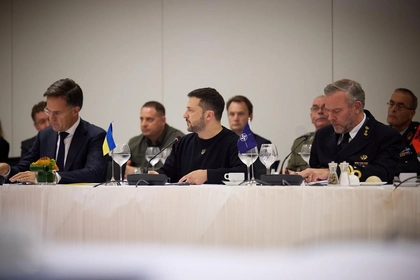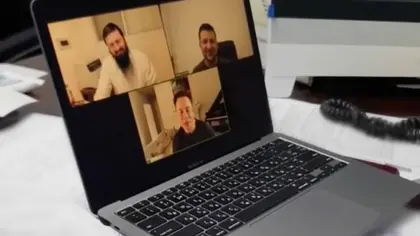President Volodymyr Zelensky recently invited Elon Musk to visit Ukraine to better understand the situation on the ground. This follows a peace plan proposed by Musk to supposedly end the unprovoked war which Russia launched upon Ukraine on Feb. 24.
As Zelensky and commentators worldwide have pointed out, Musk’s proposal would at worst risk sparking a third World War and at best ensure the current conflict drags on much longer. Zelensky’s invitation would be an easy opportunity for Musk to show his commitment to democracy around the world and demonstrate that even billionaires can still have morals.
JOIN US ON TELEGRAM
Follow our coverage of the war on the @Kyivpost_official.
Billionaire Elon Musk butting into the world’s biggest ongoing geopolitics crisis – ostensibly from an objective perspective while transparently siding with Russia – has puzzled many. In October, Musk conducted a Twitter poll among his over 100 million followers to gather opinions on a peace proposal to resolve the war in Ukraine. This would involve Ukraine holding new elections in regions of Ukraine illegally annexed by Russia; Ukraine relinquishing claim to the Crimean Peninsula; and Ukraine committing to not joining NATO.
U.S. political scientist Ian Bremmer claimed Musk told him that he had spoken directly to Russian President Vladimir Putin about the on-going war and a proposed “peace plan” to end the conflict. Musk later tweeted: “Nobody should trust Bremmer.”

Zelensky, the Budapest Memorandum and the Ukrainian Atomic Bomb: 5 Things to Know
Naturally, the Kremlin welcomed his proposal as it seemed nearly all of Musk’s talking points came straight from Russian propagandists. He justified his plan as the need to avoid having the conflict escalate into a third World War, but discerning readers could easily see through this claim.
Yet while Musk’s peace proposal is blatantly pro-Russian, his Starlink company continues to play a pivotal role for Ukraine in the war, showing an inherent conflict in Musk’s positions.
Faced with Russian attacks against Ukrainian infrastructure, Starlink has become the only means of communication for the Ukrainian armed forces on the front. In no uncertain terms, Starlink is keeping the Ukrainian resistance functional at this point. But Musk worries about continued Russian cyber-attacks on Starlink’s internet communications systems.
Musk’s wealth has given him a prominent voice on the global stage, and he relishes being at the center of attention, with the war in Ukraine highlighting just that. As he so often does, he thought he could help solve any problem, but dealing with humans is not like solving an engineering problem.
Humans are complex and often irrational, but a former KGB agent who knows how to manipulate governments and populations alike, is a whole other ball game. Putin likely saw an opportunity to play to Musk’s ego and make him feel like he had an important role to play through being a messenger. It’s an impressive method to bypass the traditional diplomatic process and send a message directly to the American public to discourage support for Ukraine and allow Russia to win through U.S. inaction.
However, as history has shown, even if the West did decide to give Putin what he wants per Musk’s proposal, Putin would only be satisfied for a short while. Then, he would continue to use his same playbook, threaten with his nuclear weapons, and gradually attempt to conquer the rest of Ukraine.
Ukraine’s historical struggles for freedom
Ukraine's long history of resistance against Russian imperial rule and later Soviet rule has always been a thorn for Russia. Ukrainians wanted an independent state, and in June 1917, they established the Ukrainian People’s Republic. Ukrainians tasted freedom for a few years, but the Bolsheviks invaded the free republic in 1919, swallowing it whole into the Soviet Union in 1921.
As a result of his perception of Ukrainians as a threat to the Soviet regime, Stalin instilled distrust of Ukrainians among non-Ukrainian Soviet citizens. He arrested thousands of "Ukrainian teachers and intellectuals" and removed Ukrainian-language books from schools and libraries. Stalin also targeted anyone with even a slight connection to Ukrainian nationalism, arresting, imprisoning, or executing them.
The possibility of Ukraine breaking away from the Soviet Union was a significant concern for Stalin, as he believed it would lead to the collapse of the Soviet Union. He sought to eliminate Ukrainian national identity and almost succeeded in permanently destroying it to prevent any challenges to Soviet unity from Ukraine.
In order to address the perceived "Ukrainian problem," Stalin implemented forced collectivization as a means of systematically starving millions of Ukrainians to death in a campaign of genocide – an atrocity known as the Holodomor or "death by hunger." This was an attempt to extinguish the Ukrainian people and their determination.
During the height of the Holodomor in June 1933, Ukrainians were dying at a rate of 28,000 people per day. This tragedy led to the promotion of a new Soviet identity and an increased emphasis on the use of the Russian language by the Soviet state. When the Ukrainian population was decimated by the Holodomor, Stalin swiftly sent Russians to "repopulate" Ukrainian regions like the Donbas.
Putin’s twisted ideology
Putin has stated that his aims for Ukraine are outlined in a controversial essay he wrote in 2021. Putin continued reiterating his frequently voiced opinion that Russians and Ukrainians are “one people,” suggesting that Ukrainian statehood ultimately depends on Moscow’s consent.
These ideas are nothing new. Putin famously told Bush in 2008 that Ukraine is not a real country. Like Stalin, Putin believes that Ukrainian statehood and the Ukrainian national identity pose a threat to Russian imperialism. Putin’s convictions will not be changed, and he intends to continue fighting for control of Ukraine indefinitely.
Musk's proposal suggests that a single referendum, taken at a specific moment in time, should be treated as absolute and irrevocable, leading to the permanent establishment of borders with no room for further consideration or debate.
In 1991, the citizens of the former Ukrainian Soviet Republic were asked to vote on whether to remain in the Soviet Union (Russia) or become independent. Ultimately, the people of each of the oblasts, including Crimea, resoundingly voted to join the new state of Ukraine. This vote was the best reflection of the people's will and stood as the basis of the internationally recognized nation of Ukraine.
Musk’s peace plan envisions Crimea as being a part of Russia. However, the Russian Unity Party that had pushed for Crimean succession into Russia had received less than 5 percent of the vote in the 2010 regional election. In 2011, a poll was conducted in Crimea and found that over 70 percent of Crimean residents considered Ukraine their motherland.
Yet, once Russia invaded Crimea in 2014, with no independent observers, Russia claimed more than 97 percent voted in favor of joining Russia. The two options to vote for were to leave Ukraine and be independent or join Russia. In May 2014, a report from the Russian Presidential Council for Civil Society and Human Rights estimated that the turnout for the Crimean independence referendum may have been as low as 30 percent.
Putin deployed this same tactic in the latest Ukrainian regions he tried to annex: Donetsk, Luhansk, Kherson, and Zaporizhzhia. Moscow went through the same performative steps, claiming that referendums showed that more than 95 percent of voters wanted to join Russia. However, independent regional reporting documented that these votes were being cast at gunpoint. It is also worth noting that, in 1991, over 90 percent of residents in regions like Kherson and Zaporizhzhia voted in favor of independence from the Soviet Union, and over 80 percent in the regions of Donetsk and Luhansk.
Plainly stated, the referendums under Russia are fraudulent attempts to reassert Moscow’s longstanding view of Ukraine’s subservience to Russia's interests, and a formality used to annex new territories into the Russian empire. Putin has made his intentions for Ukraine clear, and with the Russian military facing setbacks, Putin now desperately needs time to shore up his army after massive losses.
A complete military conquest of Ukraine is no longer a viable aspiration, so Putin is falling back to one of his commonly used options: threatening the world with nuclear weapons. Under this threat, either Ukraine prevails, or the country ceases to exist. Success for Russia in its conquest would only further embolden them and other power-hungry countries to bully the free world with nuclear terrorism.
Former U.S. President Ronald Reagan put it best in his Evil Empire speech when he said: “Like other dictators before them, [Soviet leaders are] always making ‘their final territorial demand,’ [and] some would have us accept them at their word and accommodate ourselves to their aggressive impulses. But if history teaches us anything, it teaches us that simpleminded appeasement or wishful thinking about our adversaries is folly. It means the betrayal of our past, the squandering of our freedom.”
A victory for Ukraine will ensure the continued freedom of its proud people and safeguard future generations of all countries from the threat of nuclear war. Appeasement of dictators only works for a short while before they return hungry to take more.
If Musk accepts Zelensky’s invitation, it would allow him to see the situation on the ground, hear from Ukrainians directly, and feel raw emotions from ordinary people. He would see the death and destruction the Russian war machine brought to a peaceful country. Much to his disliking, Musk would quickly be forced to see that Putin has been attempting to use him to advance the Russian agenda.
We should all encourage Musk to accept the invitation, as it would go a long way to boosting his international standing, quell rumors of a close association with Putin, and assure the Biden administration of where his loyalties lie – with the democratic world.
David Kirichenko is a freelance journalist covering Eastern Europe and an editor at Euromaidan Press. He tweets @DVKirichenko.
The views expressed are the author’s and not necessarily of Kyiv Post.
You can also highlight the text and press Ctrl + Enter






